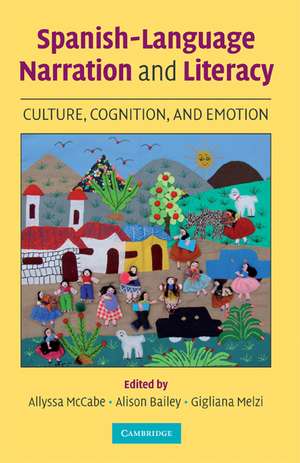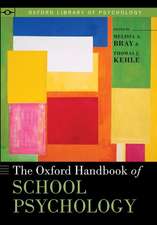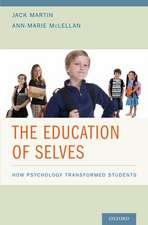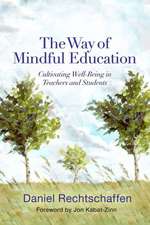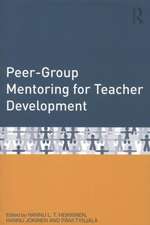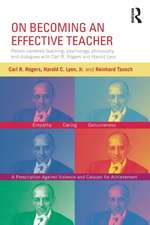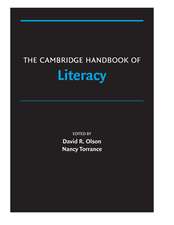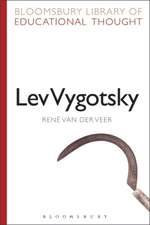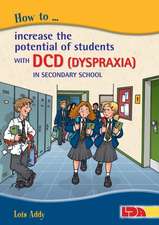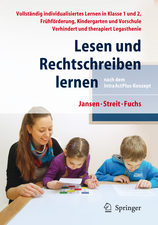Spanish-Language Narration and Literacy: Culture, Cognition, and Emotion
Editat de Allyssa McCabe PhD, Alison L. Bailey Ed.D, Gigliana Melzi PhDen Limba Engleză Paperback – 24 aug 2008
Preț: 290.76 lei
Nou
Puncte Express: 436
Preț estimativ în valută:
55.64€ • 59.50$ • 46.39£
55.64€ • 59.50$ • 46.39£
Carte tipărită la comandă
Livrare economică 17 aprilie-01 mai
Preluare comenzi: 021 569.72.76
Specificații
ISBN-13: 9780521710046
ISBN-10: 0521710049
Pagini: 382
Ilustrații: 20 tables
Dimensiuni: 152 x 228 x 20 mm
Greutate: 0.52 kg
Ediția:1
Editura: Cambridge University Press
Colecția Cambridge University Press
Locul publicării:New York, United States
ISBN-10: 0521710049
Pagini: 382
Ilustrații: 20 tables
Dimensiuni: 152 x 228 x 20 mm
Greutate: 0.52 kg
Ediția:1
Editura: Cambridge University Press
Colecția Cambridge University Press
Locul publicării:New York, United States
Cuprins
1. Introduction Alison Bailey, Allyssa McCabe and Gigliana Melzi; Part I. Parent-Child Interaction: 2. Cultural variations in mother-child narrative discourse style Margaret Caspe and Gigliana Melzi; 3. Early socio-communicative narrative patterns during Costa Rican mother-infant interaction Pablo Stansbery; 4. Lessons in mother-child and father-child personal narratives in Latino families Tonia N. Cristofaro and Catherine S. Tamis-LeMonda; 5. Evaluation in Spanish-speaking mother-child narratives: the social and sense-making function of internal state references Camila Fernández and Gigliana Melzi; 6. Love, diminutives, and gender socialization in Andean mother-child narrative conversations Kendall A. King and Colleen Gallagher; Part II. Developing Independent Narration: 7. The intersection of language and culture among Mexican-heritage children three to seven years old Alison Wishard Guerra; 8. Beyond chronicity: evaluation and temporality in Spanish-speaking children's personal narratives Paola Uccelli; 9. Narrative stance in Venezuelan children's stories Martha Shiro; 10. Mestizaje: Afro-Caribbean and indigenous Costa Rican children's narratives and links with other traditions C. Nicholas Cuneo, Allyssa McCab, and Gigliana Melzi; Part III. Links to Literacy and Other School Achievements: 11. Latino mothers and their preschool children talk about the past Alison Sparks; 12. The contribution of Spanish-language narration to the assessment of early academic performance of Latino students Alison L. Bailey, Ani Moughamian and Mary Dingle; 13. Cultural variation in narrative competence and its implications for children's academic success Sarah W. Beck.
Recenzii
“If you teach Spanish-speaking children or conduct research on language development, you’ll want to own this timely and relevant book. The ability to create oral narratives—for instance to tell someone what happened at the park—is a necessary foundation for literacy. But children learn to construct narratives as they interact with those around them, and what is included or emphasized in the narrative varies by culture. Spanish-speaking children are sometimes misinterpreted when they are actually producing narratives that are typical and appropriate in Peru or Guatemala or the Dominican Republic. The book provides information and interesting examples that can help teachers use Latino children’s distinctive narrative skills in a positive and rewarding way. Researchers will want to read the carefully designed studies that contribute materially to the literature on discourse development.”
—Jean Berko Gleason, Boston University
"The research findings of the team assembled by Allyssa McCabe, Alison L. Bailey, and Gigliana Melzi open new vistas into the shaping of Latino culture through “talk” between caregivers and children. We become who we are through conversation. Our language is our identity. This is a scholarly contribution of the highest order!"
—Ilan Stavans, author of Spanglish: The Making of a New American Language
—Jean Berko Gleason, Boston University
"The research findings of the team assembled by Allyssa McCabe, Alison L. Bailey, and Gigliana Melzi open new vistas into the shaping of Latino culture through “talk” between caregivers and children. We become who we are through conversation. Our language is our identity. This is a scholarly contribution of the highest order!"
—Ilan Stavans, author of Spanglish: The Making of a New American Language
Descriere
Deepens our understanding of narration in Latino cultures, methods of thinking and expressing emotion, and implications for school achievement.
